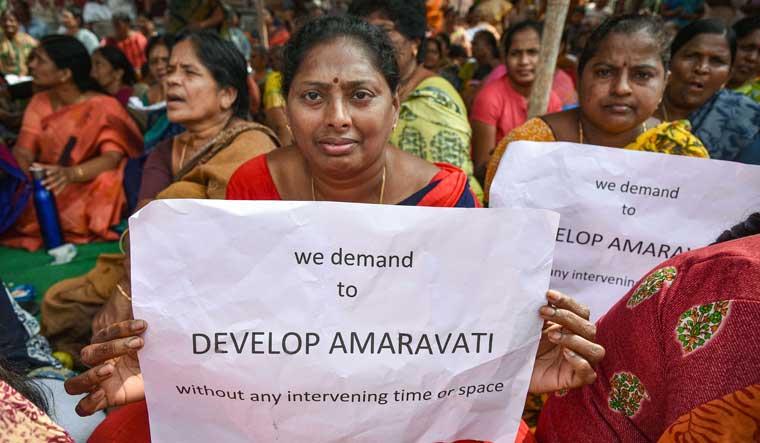
Andhra Pradesh: Why are Amaravati farmers protesting for last 800 days?

The farmers of Amaravati in Andhra Pradesh have been protesting for little over 800 days against Chief Minister Jaganmohan Reddy’s decision to stall the massive Amaravati Capital project. The farmers are opposing the state government’s plans to bring new and comprehensive legislation for developing three state capitals instead of one, against the Amaravati capital city master plan, envisaged by then Andhra CM Chandrababu Naidu in 2014.
The protesters got a shot in the arm when the Andhra Pradesh High Court, on March 3, directed the Jagan Reddy government to complete implementation of Amaravati capital city master plan in six months. The court also told the state government to give developed plots to the farmers with all amenities in the next three months. However, the present state government looks in no mood to give up its three capital plan.
In a latest, the farmers who gave lands for the Amaravati project, have sent notices to the concerned state authorities demanding full implementation of the land acquisition agreement that promised to develop farmers’ plots in a time-bound manner (three years) and sought a compensation of Rs 3 lakh per acre.
Here’s a quick look at what the farmers want and the opposing views.
What was the original plan?
In 2014, then Chief Minister Chandrababu Naidu drew up a grand plan for Amravati as state capital, which would include nine theme cities and 27 townships on 217 square km land.
About 24,000 farmers voluntarily gave their lands. Each farmer was promised 1,000 square yards of residential plot and 250 square yards of commercial plot for every acre of cultivable land given for the project. They were also promised Rs 50,000 annuity per acre with an annual hike of 10 per cent.
The Telugu Desam Party (TDP) under Chandrababu Naidu dreamt of making Amaravati not just an administrative capital but an economic and job generating hub with potential to attract large number of tourists. It managed to attract investors from abroad.
But, Jaganmohan Reddy’s YSR Congress Party came to power in 2019 and reversed Naidu’s decision to develop Amaravati as the only state capital. Reddy clearly said that the “Rs 2 lakh crore project was not his priority”. Instead, the new CM declared his three state capitals plan with Visakhapatnam as administrative capital; Kurnool as judicial capital and Amaravati to serve as only legislative capital.
As a consequence, the mega infrastructure projects in Amaravati came to a halt amid uncertainty and land prices slumped. The World Bank and the Asian Infrastructure Investment Bank too pulled out.
Why are the farmers upset?
Farmers from 29 villages of Amaravati, who had given 33,000 acres of land for the capital project, started protest because the new government’s decision to reverse the plan meant they won’t get the economic benefits of the mega project.
In 2020, the opposition led by TDP successfully stalled CM Jaganmohan Reddy’s Bills in the Legislative Council that aimed to repeal the Amaravati project. It recommended referring the Bills to a Select Committee, but the state refused to constitute the Committee citing technical issues.
Also read: Welfare? Development? Andhra faces a perilous economic future
Meanwhile, the Amaravati farmers moved the High Court while the state managed to pass the three state capitals Bill in the Assembly in June, 2020. While it did not have the approval of the Legislative Council, the Bill was considered as ‘deemed to be passed’. A month later, the Governor signed the Andhra Pradesh Capital Region Development Authority (APCRDA) Repeal Bill 2020 and Andhra Pradesh Decentralisation and Inclusive Development of All Regions Bill 2020, paving the way for trifurcation of the state capital.
In November 2021, the state repealed the two laws following farmers’ protests and appeals in the High Court, but said it won’t go back on its decision to develop three capitals. As was revealed later, the state did not intend to reverse the decision of three capitals but to overcome the loopholes in the Bill.
On March 3, 2022, a three-judge bench of the Andhra High Court, headed by Chief Justice Prashant Kumar Mishra, told the Andhra government to complete implementation of Amaravati capital city master plan in six months.

